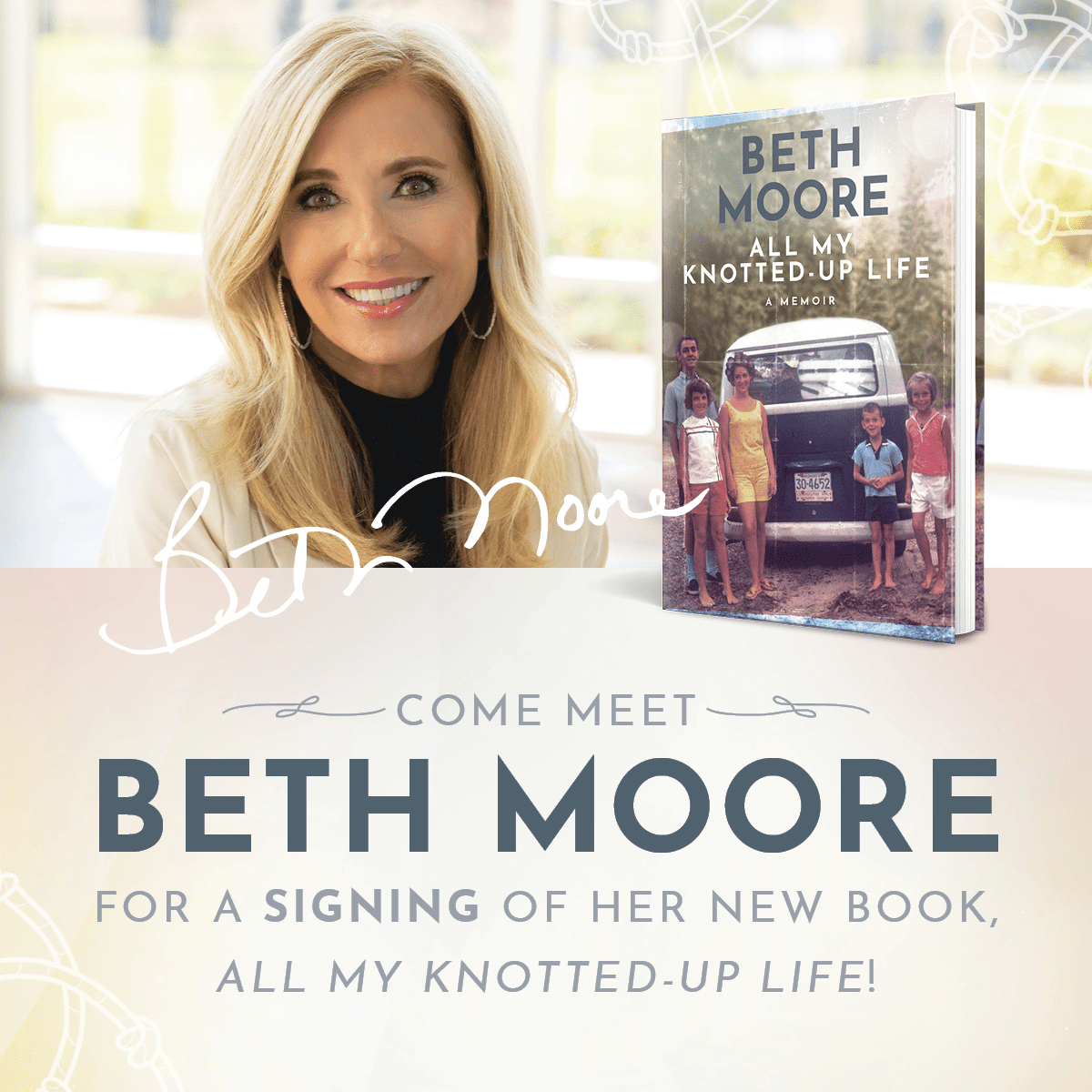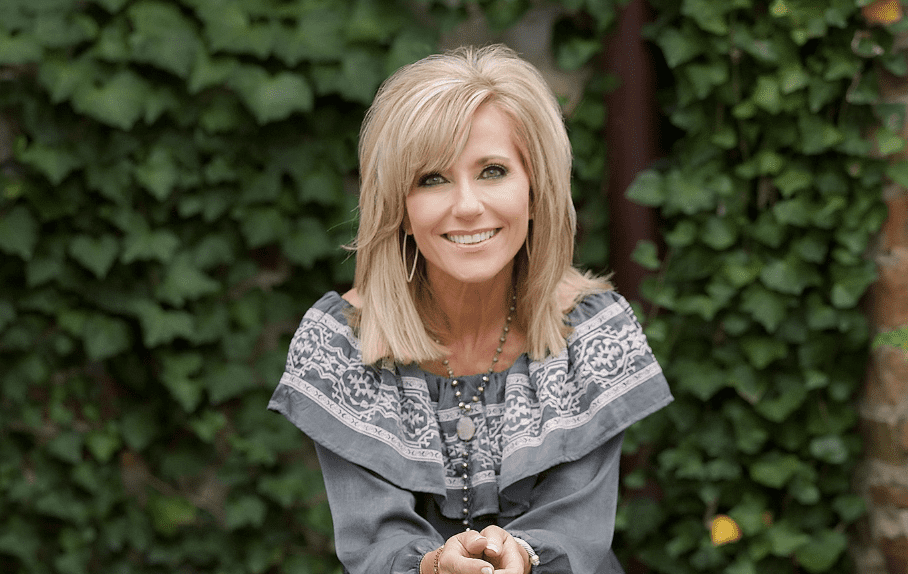The first time I encountered Beth Moore, I was attending a young women’s Bible study through the church where my husband and I were recently married. There were probably 20-30 women who attended, and the leaders—the pastor’s wife and a couple of other women—suggested that we do a study called A Heart Like His, which was a deep-dive into the life of David.
I had only been a Christian for about three years at the time, but after I had made a decision to follow Jesus, the Holy Spirit gave me a voracious appetite for the Word. I couldn’t consume enough of it. God’s Word was as refreshing to me as a natural spring, and for too much of my life, I had been dehydrated. I was a creative writing major in college, and after my conversion, it became clear to me that there was no way I could ever write anything without God slipping in between the words. The Holy Spirit had seared itself to my heart. Why even bother trying to resist?
The David study by Beth Moore further lit the fire inside me for God’s Word. She made the character of David become real to me, and through that reality, she helped more of the Bible become real. More than real: necessary. Vital. Sharper than a double-edged sword. After the David study, I sought out other studies of hers, including one on the fruits of the Spirit and one on James, the brother of Jesus. Later, I led other women through the intensive, in-depth studies.
All along the way, I wondered about my calling. Could I be a teacher, like Beth Moore? Could I write Bible studies and devotionals? Could I be used by God in this way?
All My Knotted-Up Life by Beth Moore

When I learned that Beth Moore had written a memoir, I knew for certain I would read it.
In my thirties, I drifted away from the beautiful, big-haired, authoritative woman of God I had followed in my twenties. I still wanted to be Beth Moore when I grew up, but I had begun to travel my own spiritual journey, and my path seemed to be diverging from the one she was on.
Then 2016 happened. My world shifted as if an earthquake had happened. Events in the American church left me feeling heartbroken and unmoored, hungry for a church home. Sometime in that period, I started to follow Moore on social media, and it seemed as if Beth Moore’s world had shifted too. She still loved Jesus, just like I did, and she was just as heartbroken as I felt.
The difference between Moore and me was that the spiritual fervor she felt did not seem to be quenched; no, she was standing on her convictions, a sure and straight-shooting voice of authority for the love of God and the freedom in Jesus Christ. I wanted to be that strong, still, to speak with confidence, to state my convictions with the same authority, but my faith in the church had been shaken. Moore’s tenacity and commitment to the gospel truth emboldened me. She gave me hope.
When I came to All My Knotted-Up Life, I was curious to learn more about what had formed Moore in her youth, how she started teaching and writing, and where she had arrived. Moore’s memoir answered a lot of questions I had about her early life, shedding light on the heartbreaking traumas she had alluded to in her Bible studies. She writes about these traumatic events with gentleness and care, holding those who hurt her in the everlasting light of Christ, and protecting her readers from reliving traumatic events with her. She handles these difficult moments with grace and truth.
The best memoirs present the particulars of one life in such a way that any reader can find truths about their humanity reflected in the pages. Moore’s memoir does this. There were many times I cried, many times I laughed out loud, and many times I nodded along in agreement, that’s just like me, I thought, I thought I was the only one.
One such moment happened mid-way through her memoir. Moore just finished studying the Bible with mentor Buddy for the first time. She writes:
“The second he closed in prayer, I stood up from my chair, grabbed my purse, and walked straight out the door without a word. Instead of staying for the service, I walked quickly down the stairs and through the hall and out the door to the massive parking lot as fast as I could. I ran to my car, threw my purse in the passenger seat, got in, shut the door, and burst into tears. ‘I don’t know what that was,’ I cried to God, leaning forward toward the windshield in case he couldn’t see me through the roof, ‘but I want it.’…
…That night in the car, I suppose before I even turned the ignition, God, in effect, struck a match against a stone and lit a torch in my heart for the Scriptures that has never been quenched. The intensity of the flames rises and recedes from day to day, but in thirty-five years, the fire God set within me that evening has never gone out. I didn’t deserve it or earn it. I don’t really even understand it, but I’ve yet to get my fill of Bible study. I’ll come to a sudden realization how two scenes in Scripture connect and still slap my desk over it.”
Yes. Yes, yes, yes.
Right smack in the middle of those two paragraphs, Beth Moore writes this aside:
“There are not many parts of my life story that make me cry nearly every time I tell them, but this one does. We can’t always define what we yearn for in Christ. We don’t even know such sacred affections are possible for regular run-of-the-mill humans like us until we see it in someone else.”
That was me, with you, I thought to myself, weeping.
I still want to be Beth Moore when I grow up. I haven’t had a lot of women in my life who have served as spiritual mothers. Those I have are the Lois and Eunice to my Timothy, faithful grandmothers and mothers in the faith who have spurred me on, encouraging me on, simply by their faithfulness to the gospel. If she can do it, I can do it too.
I count Beth Moore to be among those women. Moore’s memoir is hopeful, redemptive, and filled with joy, a shout of praise to the God who never leaves us, a God who always loves us, a God who sees.





 Copyright
2024
Root and Vine
Copyright
2024
Root and Vine